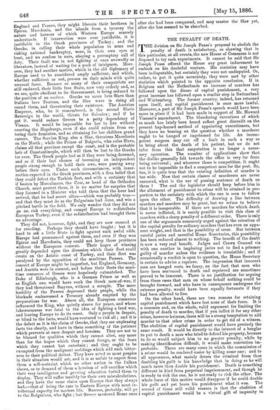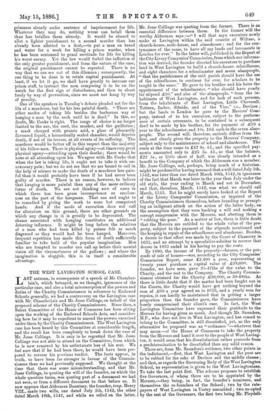THE PENALTY OF DEATH.
THE division on Sir Joseph Pease's proposal to abolish the penalty of death is satisfactory, as showing that in this particular, at all events, the new House of Commons is not disposed to try rash experiments. It cannot be said that Sir Joseph Pease offered the House any great inducement to embark on his doubtful venture. His statistics may have been indisputable, but certainly they were not undisputed. Or, rather, to put it quite accurately, they were met by other statistics which pointed to the opposite conclusion. If in Belgium and the Netherlands no increase of murders has followed upon the disuse of capital punishment, a very great increase has followed upon a similar step in Switzerland and Wiirtemberg. The former country, indeed, has returned upon itself, and capital punishment is once more lawful. Moreover, a part of Sir Joseph Pease's speech would have been more in place if it had been made in support of Mr. Howard Vincent's amendment. The blundering executions of which so much has lately been heard reflect great discredit on the present hap-hazard method of appointing executioners, but they have no bearing on the question whether a murderer ought to be hanged or imprisoned for life. An incom- petent surgeon may cut off a limb in such a way as to bring about the death of his patient, but we do not infer from this that amputation is no longer a neces- sary operation. The number of applications show that the dislike generally felt towards the office is very far from being universal ; and wherever there is competition, it ought not to be impossible to find a competent man for the post. So, too, it is quite true that the existing definition of murder is too wide. Now that certain classes of murderers are never executed, what is the use of passing sentence of death on them I The end the legislator should keep before him in the allotment of punishment to crime will be attained in pro- portion to the certainty with which the one is seen to follow upon the other. The difficulty of drawing a line between murders and murders may be great, but we refuse to believe that it is insuperable. If there are murders for which death is never inflicted, it is surely possible to visit this class of murders with a sharp penalty of a different order. There is only one of the arguments commonly urged against the retention of the capital penalty for ordinary murders that has even an appa- rent weight, and that is the possibility of error. But between careful juries and merciful Home Secretaries, this possibility
has been reduced almost to nothing. The benefit of the doubt is now a very real benefit. Judges and Crown Counsel vie with one another in imploring juries not to find a prisoner guilty of murder unless the evidence is irresistible ; and if occasionally a verdict is open to question, the Home Secretary is certain to advise a reprieve. The impression that innocent men are hanged rests, we fancy, on the fact that men who have been sentenced to death and reprieved are sometimes proved to be innocent. There is no justification for arguing from these cases that men on whose behalf nothing could be brought forward, and who have in consequence undergone the extreme penalty, would have been equally fortunate if they had been allowed to live.
On the other hand, there are two reasons for retaining capital punishment which have lost none of their force. It is a common and, on the whole, valid argument for limiting the penalty of death to murder, that if you inflict it for any other crime, however heinous, there will be a strong temptation to add murder to that other crime in order to get rid of a witness. The abolition of capital punishment would have precisely the same result. It would be directly to the interest of a burglar to put to death a man who tried to defend his property, because to do so would subject him to no greater penalty, while by making identification difficult, it would make conviction im- probable. There are many cases in which the commission of a crime would be rendered easier by killing some one; and to all appearance, what mainly deters the criminal from thus doubling his guilt is his knowledge that in doing so he will much more than double his punishment. Death is something different in kind from perpetual imprisonment, and though he is ready to risk the one, he is not ready to risk the other. The whole force of this motive would disappear if he could double his guilt and yet leave his punishment what it was. The second of these still valid reasons is that the abolition of capital punishment would be a virtual gift of impunity to prisoners already under sentence of imprisonment for life. Whatever they may do, nothing worse can befall them than has befallen them already. It would be absurd to allot a lighter punishment to a second murder than has already been allotted to a first,—to put a man on bread and water for a week for killing a prison warder, when he has been sentenced to penal servitude for life for killing his worst enemy. Yet the law would forbid the infliction of the only greater punishment, and from the nature of the case, the original punishment cannot be repeated. There is no way that we can see out of this dilemma ; consequently, the one thing to be done is to retain capital punishment. At least, if we let it go, we shall have greatly to increase our prison staff, to instruct the men composing it to be on the watch for the first sign of disturbance, and then to shoot freely by way of prevention, since we must not hang by way of penalty.
One of the speakers in Tuesday's debate pleaded not for the life of a murderer, but for his less painful death. " There are other modes of taking life besides the barbarous way of hanging a man by the neck until he is dead." In this, no doubt, Mr. Cooke is right. The range of choice is no longer limited to the axe, the cord, the musket, and the guillotine ; a mask charged with prussic acid, a glass of pleasantly flavoured liquid, a hermetically sealed chamber, would deprive death, if not of its terrors, at all events of its suffering. The murderer would be better off in this respect than the majority of his fellow-men. There is physical agony—at times very great physical agony—attetding upon their deaths ; there would be none at all attending upon his. We agree with Mr. Cooke that when the law is taking life, it ought not to take it with un- necessary pain ; but we do not see that we are bound to call in the help of science to make the death of a murderer less pain- ful than it would probably have been if he had never been guilty of murder. There is no reason, however, to believe that banging is more painful than any of the more ordinary forms of death. We are not thinking now of cases in which there has been gross incompetence or careless- ness on the part of the hangman. That can and ought to be remedied by giving the work to none but competent hands. And if the mode of execution does not call for alteration on this ground, there are other grounds on which any change in it is greatly to be deprecated. The shame associated with hanging constitutes an additional deterring influence. It might be long before the relatives of a man who had been killed by poison felt as much disgraced as they would had he been hanged. Moreover, frequent repetition has made this form of death sufficiently familiar to take hold of the popular imagination. Men who are tempted to murder can call up before their mental vision all the circumstances of the gallows ; and where the imagination is sluggish, this is in itself a considerable advantage.



































 Previous page
Previous page